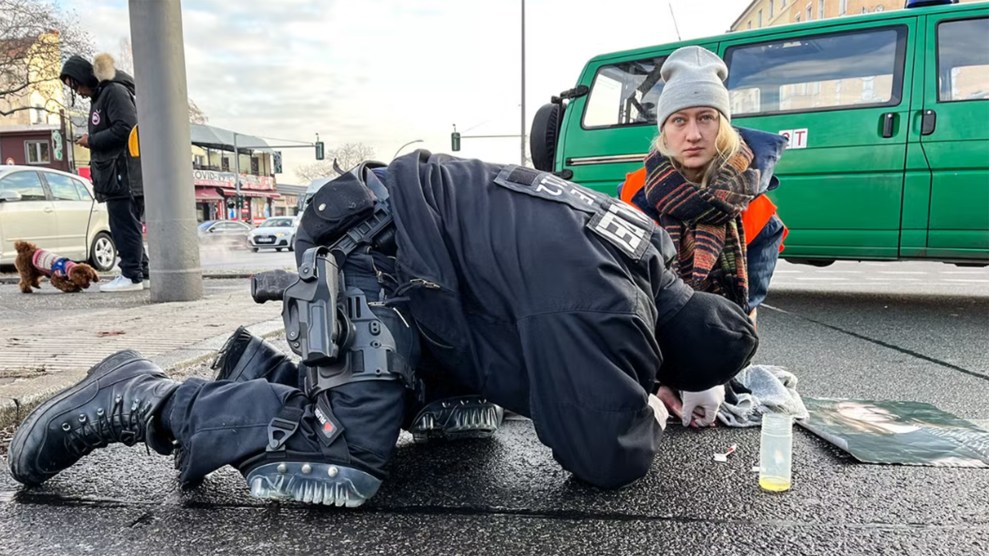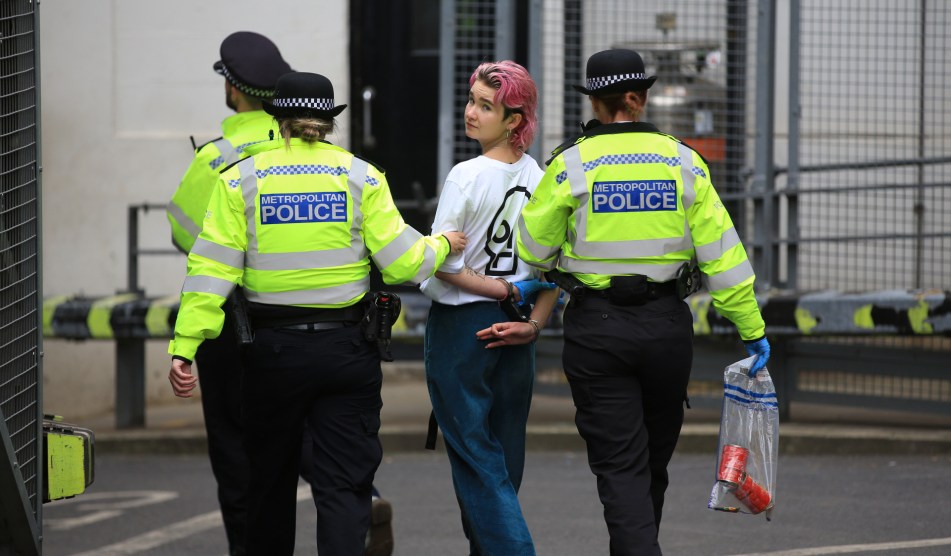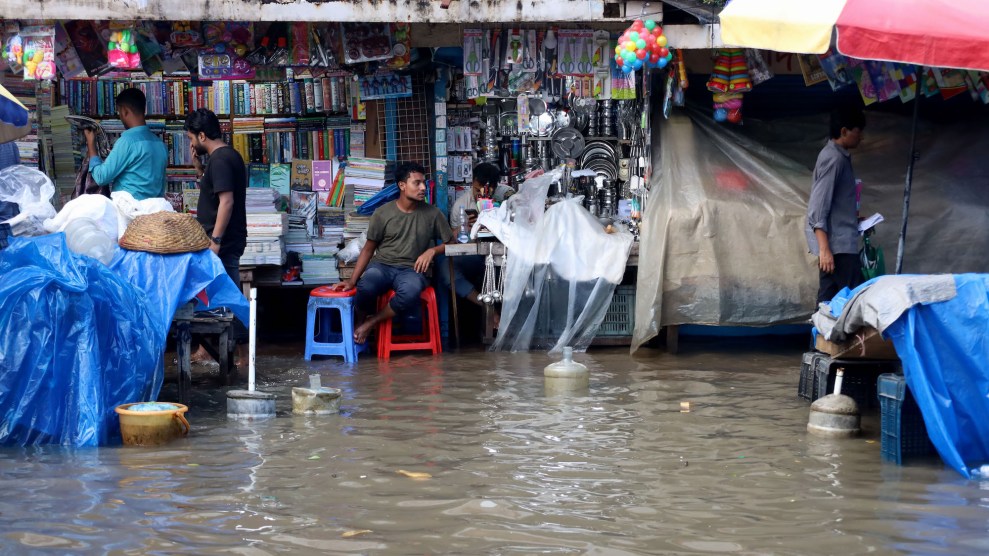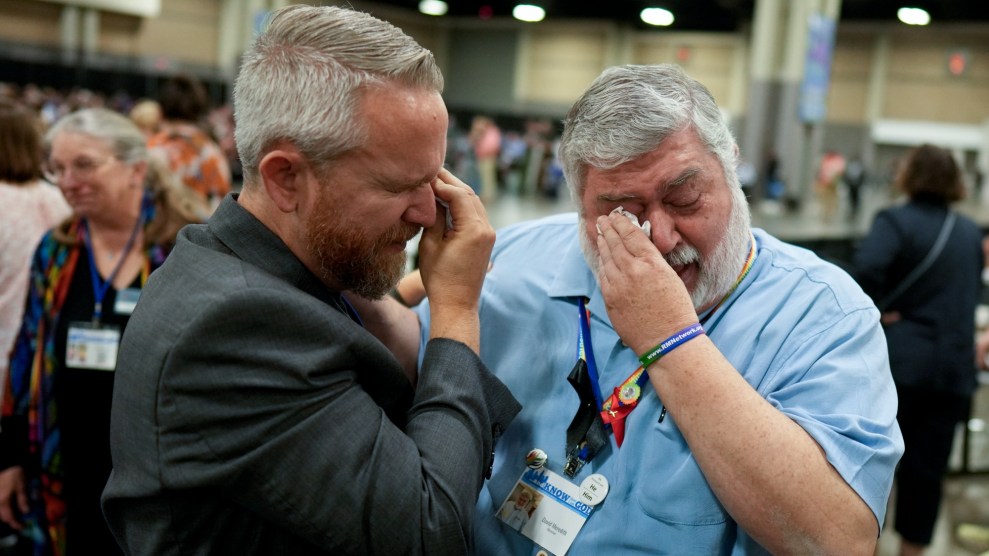
A Berlin police officer uses cooking oil in an attempt to free the hand climate activist Melanie Guttmann has glued to the pavement.Bryn Stole/Slate
This story was originally published by Slate and is reproduced here as part of the Climate Desk collaboration.
It took only a split second after the climate activists strode into the busy Berlin intersection for drivers on their morning commute to realize what was happening. Several leaped from their vehicles to wrestle the activists off the road, but two of the young people had already super-glued their hands to the freezing-cold pavement.
For the next hour, as traffic trickled through the partially blocked lanes, drivers regularly slowed down to hurl abuse at the activists. Police officers used cooking oil to dissolve the glue and remove the protesters from the blocked lanes as profanity-laced shouts of “Bums!” “Morons!” “Get a job!” and “You’re all nothing but failures!” pierced the cold December air. Even an ambulance driver, siren blaring, made a point of rolling down his window and letting the activists know just what he thought of them.
Unleashing anger was part of—or perhaps even the entire point of—the exercise. These activists, from Germany’s Letzte Generation (Last Generation) group, are here to annoy, irritate, and piss off German society. It doesn’t matter what you call them, as long as you’re talking about them. And on those terms, their project is working.
Letzte Generation activists have thrown potatoes at a Monet and motor oil at a Klimt, scaled the Brandenburg Gate, sneaked onto airport tarmacs, and pounded away at the street in front of the German Ministry of Transport with jackhammers. They’re widely referred to as Klima-Kleber, or “climate-gluers,” for their enthusiasm for super-gluing themselves to a dizzying array of things—the gilt frames of famed paintings, dinosaur skeletons, buildings, walls, and all manner of roadways and streets.
But they cause plenty of other havoc too. Just before Christmas, a group of Letzte Generation activists drove a hydraulic lift truck onto the square between the American and French embassies in Berlin and, directly under the noses of police, sawed off the tip of the city’s giant Christmas tree.
Now, after a year of escalating demonstrations and street blockades mostly in Berlin and Munich, the group plans to take its campaign nationwide. Letzte Generation leaders last week said that the newest phase in their protest offensive will launch Feb. 6.
We will “disrupt daily life in as many places as possible and as often as possible,” Aimée van Baalen, a 23-year-old spokesperson for the group, told German reporters in January during a Zoom press conference. “We will not stop protesting until we are given a chance at a future worth living and stand ready to bring the entire republic to a standstill should our protests continue to be ignored.”
As the right-wing German tabloid BILD put it in a recent headline: “Climate Extremists Threaten All of Germany.”
As she sat with her bare hand glued to the asphalt of the Fürstenbrunner Weg, Melanie Guttmann told me she understood and even sympathized with the rage her group’s protests were provoking among workers trapped in gridlock. But Guttmann, who’s been with Letzte Generation since its founding in 2021, described that as the cost of a strategy that has won the group enormous publicity.
“Of course this creates anger, and I can understand that,” said Guttmann, 27, who said she’d worked as an IT project manager before quitting her job to devote herself full time to activism. But “over the last few months, we got the opportunity to go on TV shows to talk about why we are here and that we need to take action now,” she said. “So yeah, I think that it’s effective.”
The attention-grabbing tactics have also swelled the ranks of Letzte Generation, which regularly hosts lectures and recruiting sessions at bars and online. As recently as last summer, Letzte Generation was little more than a noisy but small band of committed activists. Now the group claims hundreds of members, perhaps a thousand, and stages demonstrations multiple times a week.
As part of Letzte Generation’s campaign of disruption, which began in earnest only a year ago, police have issued criminal citations to over 700 people in Berlin alone. A senior Berlin official said last month that police in the city had spent roughly 233,000 hours responding to the protests since January of last year.
The activists argue that they don’t have an alternative.
Guttmann, like many of the younger Letzte Generation activists, took part in the youth-led Fridays for Future school strikes and protest marches—an international effort launched in part by Greta Thunberg in Sweden in 2018—which found particular resonance and mass support in Germany.
Although Fridays for Future activists won a lawsuit that would force the German government to expand its plan to reduce carbon emissions to zero by 2050, the youth-led marches were viewed by many—even opponents—as charmingly earnest, perhaps even cute. To the activists who eventually found their way to Letzte Generation, the strikes and marches weren’t doing enough.
“There were over 1 million people on the streets with Fridays for Future in Germany, and I was shocked that, even then, the government didn’t really take action,” Guttmann told me as she pressed warming pads onto her exposed hand and waited for the Berlin police to remove the glue binding it to the pavement. “And I said, ‘OK—if it’s not enough to have 1 million people demonstrating in the streets, then we need something different.’ And, like, we need civil resistance, we need to break laws.”
Micha Frey, another Letzte Generation activist taking part in the street blockade that morning, said he’s been involved in climate activism for years, taking part in Fridays for Future protests and organizing with Germany’s Green Party.
“But as the months and years went on, my frustration was always growing,” said Frey. A student who had been working on a master’s degree in European politics at the University of Passau in Bavaria, Frey, 24, put his studies on hold to join Letzte Generation in June, impressed that the group had devised “a new approach … that simply cannot be ignored. You’re blocking people in places where they cannot look away, where they have to react in some way or other.”
It takes about a day for the super glue favored by the activists to fully wash off the hand, Frey told me. His two fellow activists who’d glued themselves to the pavement that day—Guttmann and a young blond woman in a white puffy coat—showed me their hands after the police finally removed them from the street. They were red and swollen from the cold, dripping with oil, and still partially covered with dirt and bits of asphalt. “It hurts a lot and it’s fucking cold, but yeah, it’s worth it,” Guttmann said.
The group’s tactics have not just enraged opponents but have also alienated potential allies and prompted an endless wave of hand-wringing in the German press, especially in Berlin and Munich, where the activists have been most active. Right-wing politicians have compared the group with the Red Army Faction, the notorious West German left-wing terror group that rocked the country in the 1970s with a spectacular series of bombings, kidnappings, and shootouts.
Conservative opposition politician Friedrich Merz, the successor to Angela Merkel as leader of the center-right Christian Democratic Union party, denounced Letzte Generation as a criminal organization and has pushed the police to use more aggressive tactics against it.
The group has also divided a German court system that some see as ill-equipped to handle a sustained campaign of civil disobedience by committed, well-organized (and apparently well-financed) activists. (Much of Letzte Generation’s cash, according to the group, comes from anonymous small donors, although prominent deep-pocketed backers include the Climate Emergency Fund, which is funded by Aileen Getty, heiress to the Getty oil fortune, and Hollywood director Adam McKay, among others.) Some German judges have shown some sympathy with the group’s motives, while courts in conservative Bavaria have ordered members to be held in so-called preventive detention.
Interestingly, many of Letzte Generation’s demands aren’t too far from the mainstream. Banners and posters at blockades regularly call for bringing back cheap nationwide rail passes, a popular temporary policy from last summer, and imposing a 100-kph speed limit on the country’s highways to promote fuel efficiency.
In fact, Germany’s Green party, which forms a key part of Social Democratic Chancellor Olaf Scholz’s current ruling coalition, has pressed for both of those policies, helping drive efforts to bring back the popular 9-euro monthly transit pass and pressing for speed limits in government negotiations. A third key Letzte Generation demand—legalizing dumpster diving—recently won the backing of two prominent government ministers.
But inflation and the fallout from Russia‘s invasion of Ukraine have also unsettled Germany in ways that complicate any attempts at radical climate action. After Russian President Vladimir Putin began cutting off the natural gas supply, Germany found itself scrambling for reliable sources of energy, including what it could get from dirty lignite coal scraped out of destructive open-pit mines in the country’s last remaining coalfields.
Skyrocketing energy costs, meanwhile, have exacerbated fears that the country’s industrial manufacturing base—which remains the backbone of Germany’s economy and has weathered globalization better than industries in many other Western nations—could finally face terminal decline.
In other words, it’s a complicated moment for climate politics in Germany, one that is full of contradictions: A government notably more committed to fighting climate change is also more acutely aware of the potential costs. Huge investments are pouring into renewable energy projects—suddenly an urgent national security priority—even as coal-fired power plants make a comeback and workers rush to build liquefied natural gas terminals along the North Sea.
And over the past year, prominent Green party members have consciously distanced themselves from the Letzte Generation activists.
Letzte Generation’s name stems from the group’s conviction that the current youth generation is humanity’s last chance to avert a looming climate catastrophe. They’ve read the dire, worst-case scenarios in scientific reports and have taken the existential stakes to heart. They’ve also grown up in a world where, despite decades of alarming research and a procession of international agreements, major global action on climate change still seems elusive.
In a certain sense, this foreboding fear of catastrophe echoes the origins of Germany’s Green party, whose roots trace back to the anti-war and environmentalist movements of the 1960s and 1970s but which really coalesced in an ardent West German anti-nuclear movement charged by existential anxiety: NATO and Soviet nuclear missiles were pointed at one another across the divided German border and, by 1986, radiation was wafting west from the Chernobyl meltdown.
Demonstrations against nuclear power and American nuclear weapons in Germany brought out tens of thousands of protesters and sometimes led to violent clashes with police. Anti-nuclear protesters successfully blocked a proposed power plant in the Black Forest.
From this movement came the Green party—officially known as Alliance 90/the Greens, a nod to the party’s fusion with East German civil society groups that were organized to help bring down the repressive Soviet-backed regime—which ramped up to modest electoral success into the mid-’90s. In recent years, it has gotten much more powerful, its growing strength at the ballot box correlating with a growing pragmatism in the party as it has confronted the compromise-strewn realities of governing.
Now Germany’s third-largest political party (and particularly popular with young voters), the Greens are part of the ruling coalition at the federal level and in 11 of Germany’s 16 states, where they’ve had to negotiate and cut grubby deals, such as the deeply controversial recent decision to let a German coal company demolish the village of Lützerath for an open-pit mine—in exchange for a quicker end to coal production and as a way to spare five other villages slated for demolition.
That compromising approach puts the Green party a long way from the hippy-ish, unruly activism scene that birthed it.
As hundreds of German police prepared to clear the village to make way for bulldozers and excavators, climate activists protested outside the Green party’s Berlin headquarters. Two months earlier, Letzte Generation had blasted the building with bright orange paint, and glued themselves to the facade.















